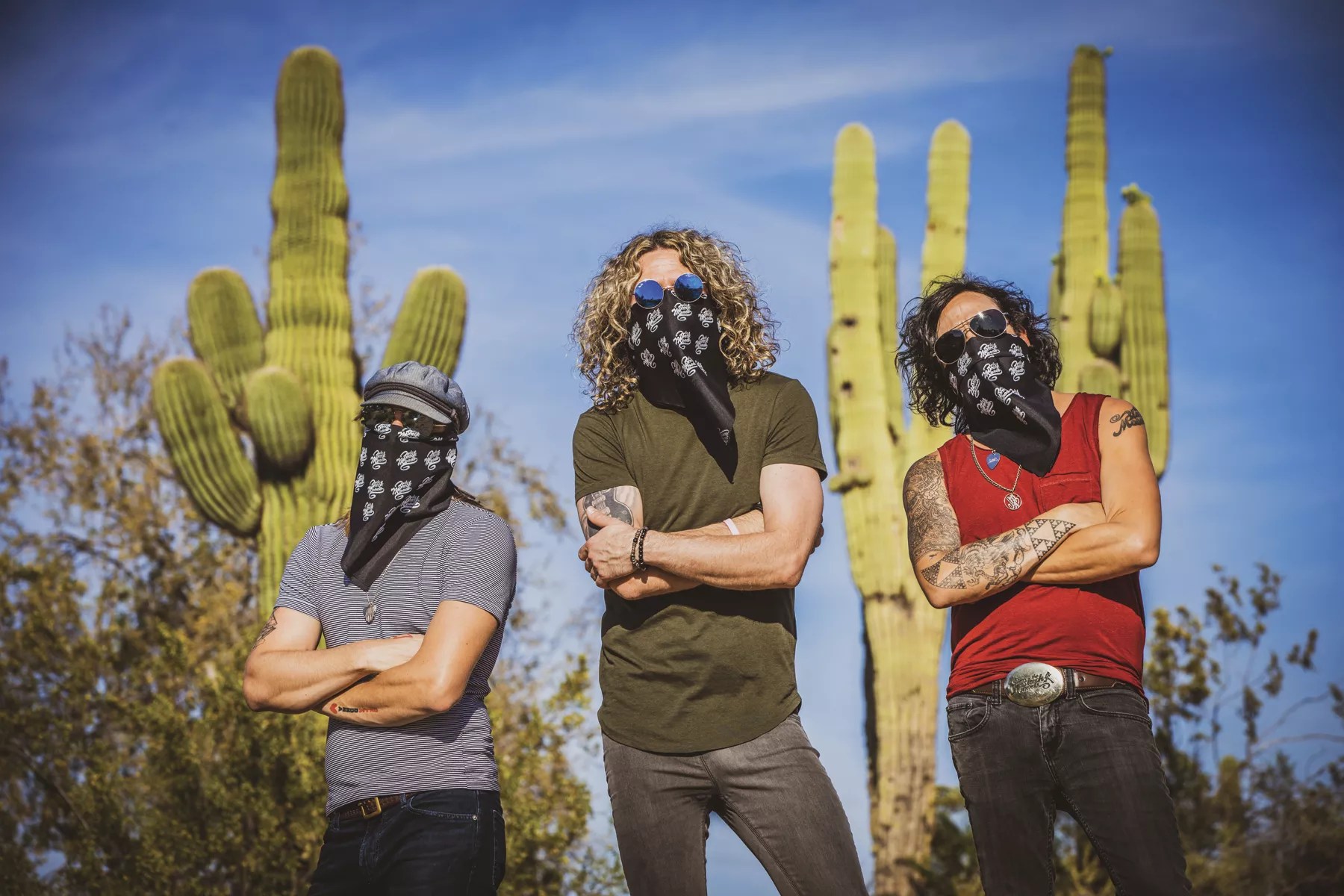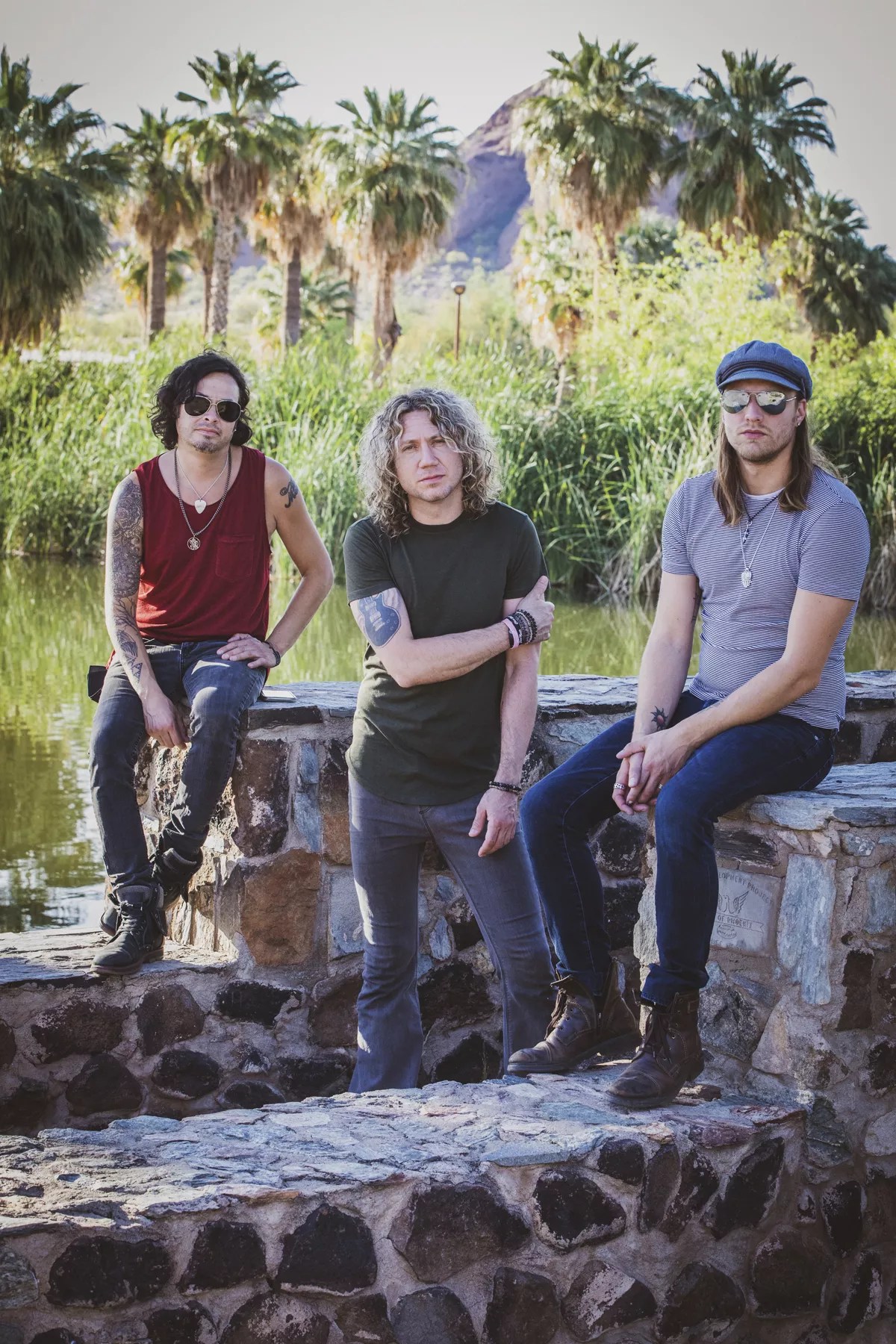
Jacob Tyler Dunn

Audio By Carbonatix
In an alternate universe – the one that existed in America before March of this year – The Black Moods would have played their first-ever stadium show last week. The Tempe rock trio were scheduled to open for Metallica at Rock City Campgrounds at Charlotte Motor Speedway in North Carolina on May 1, as part of the Epicenter Festival put on by rock promoter Danny Wimmer Presents.
And then – you know what happened.
In April, there was a tinge of frustration in the voice of the band’s guitarist and vocalist Josh Kennedy (bassist Jordan Hoffman and drummer Chico Diaz round out the group) as he talked with Phoenix New Times about the missed opportunity. But it didn’t hold for long. Kennedy is already thinking about the next thing.
“One thing with all this downtime is that we’ve been able to get our studio dialed in,” he says. “We’ve been writing a ton.”
That drive to keep pressing on is what brought Kennedy from the small town of Wheaton, Missouri, to the Valley in the early 2000s and eventually landed him a gig as the Gin Blossoms’ guitar tech. He met Diaz in 2003, and the two have played together ever since.
The Black Moods formed about seven years ago, with Hoffman joining in 2017. He and Kennedy bonded over being raised by fathers who played in bands and fed them a steady diet of Led Zeppelin and Bad Company. Those influences shine in the band’s body of work.

Left to right: Chico Diaz, Josh Kennedy, and Jordan Hoffman
Jacob Tyler Dunn
“Somebody called us ‘modern classic rock,'” says Hoffman. “I’ll take that, I guess.”
But before they start working on that new material, The Black Moods still have to release Sunshine, the album they’ve been writing and recording for the last three years. (It’s out May 8.) They considered delaying the release, but that conversation didn’t last long.
“We tossed [the idea] around for maybe five minutes,” says Kennedy. “We’ve wanted to get this thing out for so long. It’s such trying times at the moment.”
While the band’s name aptly describes how everyone feels inside their homes right now, the album’s title and the music on it might be exactly what music lovers need to get them through social distancing. Sunshine is a fun, refreshingly simple record – the kind that will have critics talking about a return to a bygone era of rock ‘n’ roll.
“Bad News” is one of those bangers you would expect to hear during the end credits of a ’90s Jerry Bruckheimer action blockbuster, while “Bella Donna,” inspired by The Doors, is a perfect summer single, its bluesy riff practically begging you to break out your air guitar.
It took seven years for “Throwing Shade” to make it on a Black Moods album. The single’s inclusion on Sunshine is due in no small part to a songwriting assist from Eve 6’s Max Collins – an unusual experience that Kennedy says he enjoyed.
“Whenever you write with other people, it’s kind of weird, like going out on a blind date, except you’ve looked up to them your whole life,” says Kennedy.
Listeners might already be familiar with some of these tracks once they get around to streaming them. “Bad News” peaked at No. 24 on Billboard‘s Mainstream Rock Songs chart last year, and “Bella Donna” hit No. 29 on the same chart in 2018.
The Black Moods achieved those successes without the help of a major label; Sunshine is being released by the independent label Steelhorse Entertainment. The band’s previous album, Medicine, came out on Another Century, which was acquired by Sony Music Entertainment in 2015 while The Black Moods were putting that record together.
The band’s brush with a major label wasn’t a great experience.
As with Sunshine, Medicine is filled to the brim with tracks that seem destined for rock radio. But like Eddie in the Tom Petty classic “Into the Great Wide Open,” the label’s A&R guy didn’t hear a single. Their songs wouldn’t be marketed, thus leaving them off radio station playlists.
“We said, ‘Are you kidding me? What do you mean, ‘This isn’t radio-friendly?'” recalls Diaz.
“No sooner than we were done with the record, they were telling us they would focus on the radio with the next album,” adds Kennedy.
“We didn’t know then what we know now,” says Diaz.
They learned a lot from the experience. One big takeaway was to trust their own instincts over a label’s. But another was that, even in the age of streaming, radio was important for a band with their sound. In the rock-oriented world of The Black Moods, radio can help you break into markets outside of your region. It could take them from Southwest clubs to a Southeast stadium opening for Metallica.
“It puts us in competition with heavy hitters,” explains Diaz. “It puts on the radar for agents. To get big tours, people have to know who you are so you can sell tickets.”
Sunshine was supposed to be a launching point for The Black Moods. They’ve got the songs, the drive, and fans; they’re ready to break out of Arizona. But now they can’t tour in support of the record. And touring is what they love to do.
Before the coronavirus, the band refurbished a prisoner transport from California, adding everything from beds to a microwave.
“One of the reasons why we bought it is because it still had the cop lights on it, and they still work,” says Diaz.
But it will be a while before they get that sweet ride back on the road. So for now, they’re adjusting to the world of Facebook Live performances from inside their studio. They’ve been doing them on an almost weekly basis leading up to the release of Sunshine.
Kennedy sees livestreaming as a way to reach new fans they wouldn’t normally reach on tour. Playing concerts on the internet is not without drawbacks, though.
“The afterparties are pretty mild,” says Kennedy with a laugh. And setting up the studio and video equipment for the livestreams is a bit of a pain, too. “Who knew that being off-tour would be more work than being on tour?”
They also miss the small things, like the feedback from the audience after a song. “It’s like an uncomfortable silence,” Kennedy says.
But despite the hurdles that musicians will have to overcome when things finally get back to normal, Diaz doesn’t see the band’s sound or strong work ethic changing much as a result of the pandemic.
“We work hard 80 hours a week at this,” Kennedy says, “so we don’t have to work 40 hours at a job.”